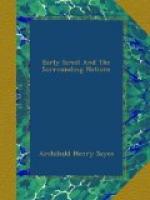The turn of Tyre came next. For thirteen years it was patiently blockaded, and in B.C. 573 it passed with its fleet into Nebuchadrezzar’s hands. Five years later the Babylonian army marched into Egypt, the Pharaoh Amasis was defeated, and the eastern part of the Delta overrun. But Nebuchadrezzar did not push his advantage any further; he was content with impressing upon the Egyptians a sense of his power, and with fixing the boundaries of his empire at the southern confines of Palestine.
His heart was in Babylonia rather than in the conquests he had made. The wealth he had acquired by them was devoted to the restoration of the temples and cities of his country, and, above all, to making Babylon one of the wonders of the world. The temples of Merodach and Nebo were rebuilt with lavish magnificence, the city was surrounded with impregnable fortifications, a sumptuous palace was erected for the king, and the bed of the Euphrates was lined with brick and furnished with quays. Gardens were planted on the top of arched terraces, and the whole eastern world poured out its treasures at the feet of “the great king.” His inscriptions, however, breathe a singular spirit of humility and piety, and we can understand from them the friendship that existed between the prophet Jeremiah and himself. All he had done is ascribed to Bel-Merodach, whose creation he was and who had given him the sovereignty over mankind.
He was succeeded in B.C. 562 by his son Evil-Merodach, who had a short and inglorious reign of only two years. Then the throne was usurped by Nergal-sharezer, who had married a daughter of Nebuchadrezzar, and was in high favour with the priests. He died in B.C. 556, leaving a child, whom the priestly chroniclers accuse of impiety towards the gods, and who was murdered three months after his accession. Then Nabu-nahid or Nabonidos, the son of Nabu-balasu-iqbi, another nominee of the priesthood, was placed on the throne. He was unrelated to the royal family, but proved to be a man of some energy and a zealous antiquarian. He caused excavations to be made in the various temples of Babylonia, in order to discover the memorial-stones of their founders and verify the history of them that had been handed down. But he offended local interests by endeavouring to centralise the religious worship of the country at Babylon, in the sanctuary of Bel-Merodach, as Hezekiah had done in the case of Judah. The images of the gods were removed from the shrines in which they had stood from time immemorial, and the local priesthoods attached to them were absorbed in that of the capital. The result was the rise of a powerful party opposed to the king, and a spirit of disaffection which the gifts showered upon the temples of Babylon and a few other large cities were unable to allay. The standing army, however, under the command of the king’s son, Belshazzar, prevented this spirit from showing itself in action.




